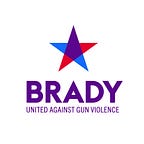What is the Protection of Lawful Commerce in Arms Act (PLCAA)?
Reforming the Gun Industry: If you can’t beat ’em, ask Congress for a favor
By Kelly Sampson, Counsel
Since Brady Legal works diligently to prevent gun violence from taking any more lives, we take birthdays very seriously. October 26 will see several notable birthdays: Secretary Hillary Clinton, actor Seth MacFarlane, and … dun dun dun … the Protection of Lawful Commerce in Arms Act, aka “PLCAA.”
While Brady wishes Secretary Clinton, MacFarlane, and all who will blow out candles on the 26th many happy returns, we cannot say the same for PLCAA.
PLCAA is a federal law that gives gun manufacturers, distributors, and dealers (“the gun industry”) protections unlike any other industry.
To understand the ins and outs of PLCAA requires a brief introduction to law 101. A “tort” provides a right to compensation to those wrongfully harmed by someone else. Generally speaking, tort law holds private actors to the same negligence standard — a duty to use reasonable care to not foreseeably injure others.
Whether you negligently fail to shovel snow off your stoop, sell a sandwich with spoiled mayo, or market cigarettes to kids, you face the same basic standards.
That is what makes PLCAA so egregious. It treats the gun industry differently — better — than anyone else.
If courts construed PLCAA as its text — and its supporters said it should be — it would only bar lawsuits that seek to hold the gun industry liable for the mere act of responsibly selling firearms that criminals happen to use, but it would allow lawsuits against irresponsible sellers, whose negligent actions foreseeably arm criminals.
PLCAA’s author, chief sponsor and floor leader, then-Senator Larry Craig, couldn’t have been more clear:
“PLCAA does not protect firearms or ammunition manufacturers, sellers, or trade associations from any other lawsuits based on their own negligence or criminal conduct . . . As we have stressed repeatedly, this legislation will not bar the courthouse doors to victims who have been harmed by the negligence or misdeeds of anyone in the gun industry . . . If manufacturers or dealers break the law or commit negligence, they are still liable . . . The only lawsuits this legislation seeks to prevent are novel causes of action that have no history or grounding in legal principle.”
The Missouri Supreme Court found that PLCAA did not bar Janet Delana (center) from suing the Pawn Shop that sold a gun to her daughter, Colby Sue Weathers (right), even after Janet told the store that her daughter was experiencing a severe mental crisis. As a result of the sale, Colby shot and killed her father, Tex. Read more about the case.
PLCAA prohibits “qualified civil liability actions” against the gun industry. A qualified civil liability action is a tort claim for harm resulting from a third party’s criminal or unlawful misuse of a firearm.
At the same time, PLCAA explicitly allows six types of claims, including actions against sellers and manufacturers who knowingly violated applicable federal or state laws, negligent entrustment, negligence per se, and products liability claims.
Because PLCAA does not protect the gun industry from lawsuits based on its own negligence or criminal conduct, Brady Legal has brought numerous successful cases in which courts have correctly found that PLCAA does not bar liability for a dealer’s own negligent conduct.
However, some courts have misread PLCAA as providing sweeping protection.
Alaska courts held that PLCAA barred a gun dealer from negligence liability for allowing a criminal to walk out of the store with a gun without a background check, after leaving the purchase price of the gun on the counter — one of over 200 “missing” guns from the store.
Other courts have held that PLCAA exempts gun companies from liability for their negligence, or from causing a public nuisance.
This patina of PLCAA “immunity” not only leads to overly broad interpretations, but it also makes cases more difficult, expensive, and complex than necessary.
For that reason, many would-be litigants do not bring their claims at all. And the net effect makes the gun industry less subject to justice and less inclined to adopt responsible, life-saving business practices.
This is not what Congress had in mind when it passed PLCAA. That’s why proposed legislation, called the Equal Access to Justice for Victims of Gun Violence Act, would effectively repeal PLCAA and hold the gun industry to the same standards as every other industry.
We are calling on Congress to pass the Equal Access to Justice for Victims of Gun Violence Act immediately. For far too long, PLCAA has been misinterpreted which has given the gun industry a green light to put profits over people, and stop those impacted by negligent sale practices from obtaining justice. Enough is enough. The gun industry is not above the law, and the time is now to repeal special gun industry protections.
